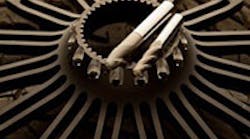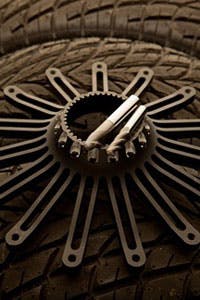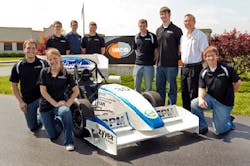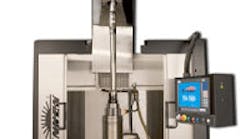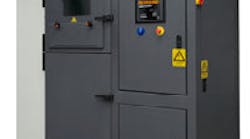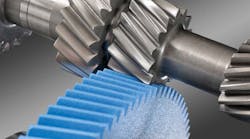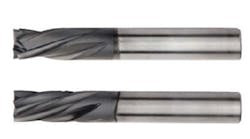True brand loyalty cannot be bought, it must to be earned, and a product supplier must remain ready to earn it because it cannot know when an opportunity to build a solid customer-relationship will arise. For IMCO Carbide Tool, one opportunity came in an e-mail from South Dakota.
Just before Christmas 2011, South Dakota School of Mines and Technology engineering student Jordan Krell did an online search for cutting tool manufacturers. Krell was one of more than 30 students who make up the Hardrocker Racing team, designing and building a racecar from the ground up according to very strict Formula SAE (FSAE) rules.
The Formula SAE concept is that a fictional manufacturing company has contracted a design team (the students) to develop a small Formula-style racecar. The prototype car is evaluated for its potential as a production model for non-professional weekend autocross racing. Each student team designs, builds and tests a prototype based on a series of rules that address onsite event operations and promote clever problem solving. Corporate sponsors donate car materials, and the competitors have just a few months to complete their project and enter their racecar in the FSAE Competition at Michigan International Speedway in just five months.
Every year the Hardrocker team – named for the school’s Black Hills locale and mining programs – builds a racecar from the ground up, to compete against other engineering schools. Participation is voluntary, and the students earn no credits for their time or work. All team members – more than 30 in 2012 – solicit sponsors for their project.
The Michigan Formula SAE competition, held at Michigan International Speedway in Brooklyn, Mich., is one of several competitions annually in the U.S. and elsewhere. More than 100 teams from around the world vie for honors in seven categories.
The FSAE competitors are one of 14 teams at the South Dakota School of Mines & Technology’s Center of Excellence for Advanced Manufacturing and Production (CAMP), which provides opportunities for students to apply their developing technical skills in real-world situations that involve teamwork, planning, designing for easiest and fastest production, fundraising, working with deadlines, and international competitions.
For Krell and his team, the initial problem was that they could not get their hands on the cutting tools they needed to produce their car parts. He e-mailed information on the project and their need for cutting tools to the top 30 suppliers he located in is online search, hoping one would be interested in a sponsorship. By hitting SEND Krell set in motion a series of events that would bring his team more tools than he thought possible. For the Hardrockers, Christmas was coming - and more than once in the months ahead.
Intriguing offer — IMCO, vice president and technical director Matt Osburn was intrigued by the e-mail message. “We’re always looking for new ways to test and prove our end-mill designs,” he said. “I thought, ‘That sounds kind of cool.’”
IMCO Carbide Tool Inc. supplies technologically advanced tools to manufacturers in many industries. In the ways the tools are designed, produced, tested and used, IMCO explains that it strives to meet the evolving needs of a technologically diverse customer base.
IMCO’s application support team leader Steve Avers — himself a journeyman machinist and a racecar builder — agreed with Osburn, so they replied to let the Hardrockers know that IMCO would join the effort. Thereafter, the supplier and the team improved their relationship with every point of contact. “This project was a perfect fit for us,” Osburn said. “Power, precision, performance: That’s what we do, and this project is an excellent example of the application of all three.
“But the reason I did it is to encourage future engineers and problem solvers. We need those people because they strengthen our manufacturing base and that strengthens our country. You can’t have a strong nation without a strong manufacturing base.”
“Usually when we need tools we have to run out to the closest cutting tool distributor and buy them,” said Evan Hoglund, the Hardrockers team member responsible for all machining. Sometimes the distributor would have it, sometimes not. Always, there would be a cost.
“We have a pretty small budget, which is why we try to get sponsors,” Krell explained. “Depending on what we need, tools can get really expensive.”
So, when IMCO expressed interest in supporting the program, Hoglund e-mailed him a list of the materials the team was working: aluminum, steels, carbon fiber and occasionally titanium. Osburn started pulling the inventory.
“We just rounded up a bunch of tools for working in those materials,” Osburn said in a typically low-key fashion, though he estimated the value of the “bunch of tools” in that first shipment at upwards of $10,000.
“It was like Christmas. It was amazing,” Krell said. “and I don’t think he even considered the tax deduction mentioned in the brochure I sent him.” The assortment included Streaker® M20 end mills for aluminum, Pow•R•Feed® M904 end mills for general-purpose machining, enDUROz® M525 end mills for titanium and nasty-hard steels, IMCO FR10 routers, and prototype tools for cutting carbon-fiber composites used for body components.
None of the Hardrockers had any formal machining training. The only experience any of the students had with machining was the tips and techniques some of the second- and third-year team members learned in prior racecar-building team experience. So, throughout the car’s development and assembly, the students consulted IMCO on speeds and feeds, techniques, and more.
Trying to keep up with the tools — “The Streakers worked really well in aluminum,” Hoglund said, “and we couldn’t even run the CNC at the higher speeds, where the tool would be most efficient.” Its limit, he said, is 6,000 rpm. He used a Pow•R•Feed M904 end mill to machine parts in steel – braces, connectors, etc. “I just used one of them to run all those parts. It’s still in good shape.”
The carbon-fiber material used for body components presented a special challenge. Hoglund recalled that because carbon fiber is composed of multiple thin layers, cutting with a rotary tool often results in frayed or delaminated edges. With the high cost of the material, sourced and donated by a generous local sponsor, the team was careful to minimize scrap. “They said the prototype tools were for cutting carbon fiber,” Hoglund recalled. “That’s what I used. They did a really good job.”
Krell said the team tries not to overdo requests to sponsors (“We don’t want to look greedy”), but they contacted IMCO again with a special need. “We needed a really big tool we couldn’t get locally,” Hoglund said. “Matt said to let him know if we needed anything else. I took him at his word.” IMCO didn’t have a tool of the requisite size, so Hoglund described what he needed to do and Osburn and Avers selected an IMCO tool that would do the job.
Finals, college graduation, and other details (like sleep) aside, the Hardrockers completed the car on schedule, often working around the clock. Several team members left shortly after graduation ceremonies for Perrysburg, Ohio, to visit IMCO on the day before the FSAE competition began, two hours north.
They arrived the next morning, welcomed by IMCO executives, employees, and some local reporters. After interviews, photos, and a demonstration of the car’s performance, the Hardrockers toured the toolmaking operation, constantly asking questions. At tour’s end, Osburn took a few of the engineers to the inventory shelves for last-minute tool selections.
“This is amazing,” Krell said. “We’ve never had this kind of reception.” The students were stunned not only by the extra tools and the other IMCO provisions that Osburn presented, but by the attention they received and the publicity that their project generated.
“We’re all going into companies that will use cutting tools,” said Hoglund. “We may not be in positions to actually spec’ the tools, but we can certainly make recommendations based on our experience. None of us is ever going to forget the reception we got.”
“Working and sharing ideas is great for these young engineers and for IMCO,” according to marketing coordinator Ashley Lockhart. “It forges a sincere, personal connection because it’s grounded in mutual interests and a shared joy in discovery. But our goal was never to groom brand advocates. The bottom line is that a group of seasoned machining professionals and tool makers just ‘found’ a team of young enthusiasts they are proud to support, and they’re all having a great time.”
At the 2012 Formula SAE competition May 7-14, the Hardrocker Racing team placed eleventh for their design, fifth autocross, and fourth in skidpad, among 120 teams.
